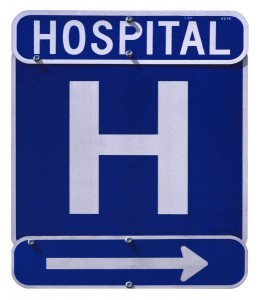 Thanks to modern medicine, we live longer and can treat the diseases of old age. As the ever-increasing demand for health care is met by an ever-increasing supply, however, we confront the possibility of an economic catastrophe.
Thanks to modern medicine, we live longer and can treat the diseases of old age. As the ever-increasing demand for health care is met by an ever-increasing supply, however, we confront the possibility of an economic catastrophe.
In a new book called 2030 – The Future of Medicine: Avoiding a Medical Meltdown, author Richard Barker discusses possible solutions. Some of what he says syncs up with what Atul Gawande discusses in his recent New Yorker article: Reduce the need for hospitals by convincing people to manage their own health.
Barker: “[K]eeping people out of hospital is probably the single most powerful step to manage health care costs.”
Personal responsibility, supervised by health workers: Nanny state or cop out?
On the subject of managing our own health, here’s an excerpt from a review of the forthcoming book that appeared in The Lancet. (emphasis added)
Barker projects us into the future to visit a family in 2030 whose members participate actively in their own health care using preventive, diagnostic, and curative technologies to prolong years of quality life. In this, they are supported by a team of health workers who devise personalised strategies for wellbeing and health maintenance using all relevant information in an integrated health-care system. The experience of this family is what it could be like if we do the right things now. We are left to imagine what 2030 could be like if we don’t.
To achieve the better vision of the future, everyone must become involved, “the future of Medicine is too important to be left to experts”, urges Barker. Central to this will be taking responsibility for our own health, especially in the avoidance of “self-inflicted diseases” caused by over-eating, under-exercising, alcohol abuse, and tobacco smoking.
As I mentioned in a previous post on Gawande’s article, those on the Right will certainly object to a “team of health workers” telling them what to do.
My objection comes from the Left. The widespread assumption that we should blame personal lifestyles for our health problems allows corporations and the governments who fail to regulate them off the hook. It’s not politically or economically comfortable to acknowledge the underlying causes of disease — poverty, inequality, air and water pollution, contaminated food, unsafe working conditions, an obesegenic environment — and take responsibility for them.
Related links:
Can better care for the neediest patients lower costs?
Can Congress Force You to Be Healthy?
Health care in America: You get what you deserve
Healthy lifestyles serve political interests
Resources:
Image: Marshall Wisconsin
Richard Barker, 2030 – The Future of Medicine: Avoiding a Medical Meltdown
Gordon Duff, Back to the future—and to the drawing board, The Lancet, January 29, 2011
Atul Gawande, The Hot Spotters – Can we lower medical costs by giving the neediest patients better care?, The New Yorker, January 24, 2011


Sorry, comments are closed for this post.